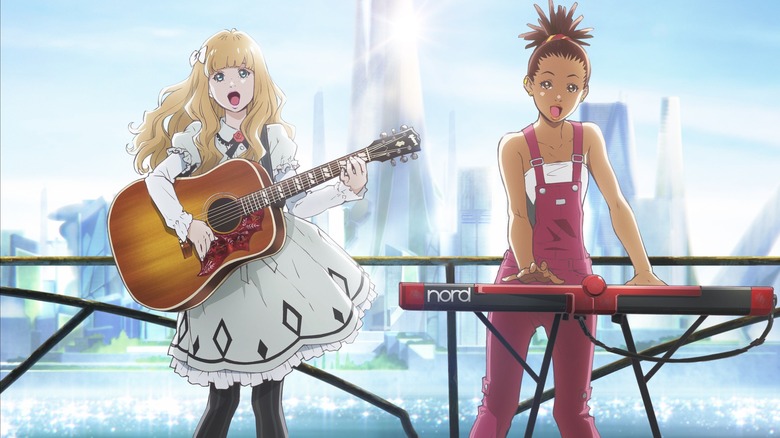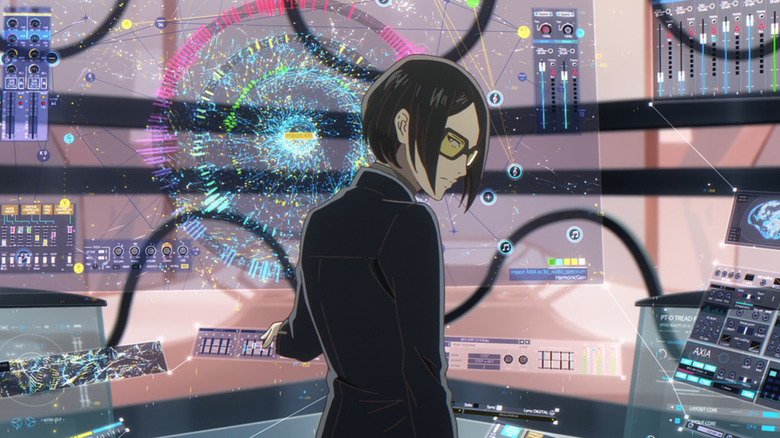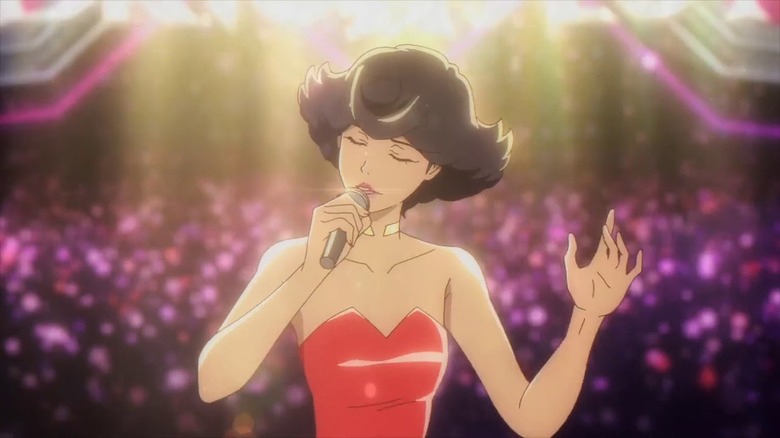The Creator Of Cowboy Bebop Made A Netflix Anime Predicting The Dangers Of A.I. Art
Artificial intelligence has been a sci-fi villain for about as long as the concept has existed, but in the past few months, we've seen the issue of AI become timely, present, and poignant. There is AI taking over journalism, AI being used to replicate actors' voices, and AI making a whole OASIS album. Artificial intelligence is also part of the negotiations that led to the Writers Guild of America's strike, as concerns about AI's role in the creative arts become more and more urgent.
It used to be a common belief that robots would take over technical jobs like programming, not the arts. This is a development few saw coming, but "Cowboy Bebop" creator Shinichirō Watanabe was one of those few. Back in 2019, Watanabe made a new anime in commemoration of the 20th anniversary of the famed studio, Bones ("Fullmetal Alchemist," "Mob Psycho 100," "My Hero Academia"), called "Carole & Tuesday."
The show's basic premise is that it takes place in the future after humanity has colonized Mars. We follow two young girls, one who escapes a repressed life of wealth as the daughter of a prominent politician; the other an orphan refugee from Earth. The two meet and instantly form a connection as they decide to become a singer-songwriter duo. The problem is, no one cares about original music made by people anymore, because all art is created by powerful algorithms and AI.
The meaning of art
From the very first episode, we meet what is essentially the third main character, Angela, a former child actor and model who is transitioning into a career as an idol. Her mother gets her a famed manager named Tao, who uses artificial intelligence and high tech to elaborately manufacture pop stars, engineer hit songs, and craft the ideal image of stardom. At first, Tao is annoyed by Angela, as he is used to working purely with AI, while the singer serves as little more than a puppet.
AI is so prominent in the world of "Carole & Tuesday" that two girls simply jamming and singing a very rough draft of a song they came up with hours earlier is enough to blow the minds of everyone who listens. Despite what Tao and other producers say throughout the anime, there is such a thing as a human element in art. Even songs as perfectly constructed and thought out by AI as the Mermaid Sisters' entry to the singing competition, Mars' Brightest, can't hit quite as hard as the simple songs by two teenage girls.
Shinichirō Watanabe is hugely and unequivocally speaking from a place of skepticism when it comes to technology, giving us not only cold and soulless AI art, but also robots that direct music videos as a front for a scam, and a Pinocchio-looking investing advisor robot who steals crypto from rich jerks. That's not to say that technology has no place in our lives, but to lose a human touch is to lose something in ourselves. Watanabe argues that music is an equalizer — a low-budget, lo-fi piano and guitar performance by two young girls can have as big if not a bigger resonance than the biggest and most expensive pop song created by a team of dozens.
The power of art
Sure, Angela still rises to superstardom thanks to her AI-made songs, while Carole and Tuesday struggle financially the entire anime, but as the opening narration of every episode tells us, it is a song made by the two girls that changes the world.
Shinichirō Watanabe may get a bit too simplistic in the way he portrays politics and social issues, but there is no denying how effective "Carole & Tuesday" is at what it does. This is because the second half of the show ramps up other timely commentaries, like the rise of right-wing fear-mongering and an anti-immigration movement on Mars — complete with Martian ICE. Meanwhile, time and time again, the anime shows the power of music to transcend barriers and bring catharsis, and to connect with people in powerful ways, like a performance at Mars' SXSW (really) inspiring an aging singer to return to her non-AI-driven music roots.
The show culminates in a phenomenal final performance of a protest song done in support of Earthian immigrants on Mars, a performance that supposedly inspires a wave of change all throughout the red planet by bringing empathy and understanding. Sure, it is cheesy and easy, but it is the perfect summary of Watanabe's ideas in "Carole & Tuesday" — that art made by human souls has something intrinsically special that can never be replicated by any machine, any corporation, or any marketing department. Not all problems can be solved by song, but art definitely has the potential to change minds, and at times even the world. With AI, however, we lose that potential.


